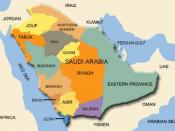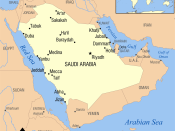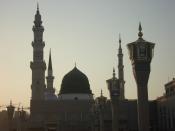Criminal Justice in Saudi Arabia: A State of Secrecy Forms of criminal justice vary throughout the world. They vary in procedures of law, punishments, and treatment of prisoners. Saudi Arabia is one country that deals with criminal justice very differently than most. Saudi Arabia practices some appalling acts on its prisoners, along with discriminatory practices against women and other minorities. Saudi Arabia has committed itself to prevent torture after attending the UN Convention Against Torture and Other Cruel, Inhumane or Degrading Treatment or Punishment in 1997. The problems lies here in which Saudi Arabia has promised to stop these hanus acts, but no results have been evident. The criminal justice system contributes to the torture. The lack of judicial security leads to detainees being treated differently on the basis of their social status, religion, political beliefs, nationality or gender. These discriminatory laws are justified under Saudi Arabian law. Osman Gedi Guled wrote in his diary regarding what happened when he tried to intervene to stop guards from beating a Non-Muslim for his refusal to take part in prayers.
He writes, "I said to the officer, 'Can I ask you a question?...Where is it found in the Kitab [the Qu'ran] that other people who are not Muslims are forced to pray?' He replied, 'It is found in Saudi Arabia.'" The government is based on Islam, and since Saudi Arabia is an Islamic State, many of the laws are taken from the Koran, which give prominence to the traditions and sayings of the Prophet Muhammad. There is no separation between church and state, which leads to minority religions, such as Christians and Sikhs, having to comply with Islamic laws. This society's dealings with its criminal offenders are rarely spoken about, but the inhumane treatment continues on.
Furthermore, this country relies on secrecy of its practices. There are no political parties, no elections, no independent legislature, no trade unions, and no independent human rights organization. The government turns its head to any human rights organizations wanting to carry out research and discloses information. Anyone living in Saudi Arabia is imposed with a fear that if they criticize the system they will be harshly punished. Since the information is disclosed about the torture and brutality, Amnesty International has repeatedly attempted to get information. Amnesty International, luckily, has interviewed victims from the Middle East about their experiences of torture and imprisonment in Saudi Arabia, to find out what really goes on in the country. Otherwise, this "secret society"ÃÂ could never be exposed for what its really worth.
The system of arrest and questioning is very different from that of America. Those that are arrested in Saudi Arabia for whatever crime, they find themselves trapped in a criminal justice system that provides them with no information about their fate. The system does not let the prisoner's prompt access to a lawyer, doctor, or even his/her family. While in America, it is a Constitutional right to obtain medical attention, a right to a lawyer during questioning, and contacting family members. There is no supervision of arrest and detention. Sometimes the detainees are tortured from the moment they are arrested. Following arrest, detainees are held and told nothing about their rights. In America, there is procedural requirement by law enforcers to inform the detainee of their rights upon arrest. If the detainee will not give the confession freely, the interrogators will use torture or deception to obtain one. This could be because the criminal justice system of Saudi Arabia treats suspects as guilty whereas here in America, people are innocent until proven guilty.
Detainees, once forced to sign a confession that may be in Arabic, a language they don't understand, or beaten brutally, are then brought to a judge. The judge is not supposed to accept a confession if it has been obtained by false ways, such as beatings. A medical examination is supposed to be required in order to find out if there were any beatings. This is required under the Convention against Torture. The judge does not follow procedure. The laws of Saudi Arabia are already so inhumane as it is, but the one chance for a detainee to get some rights, is lost due to lack of following procedure. If a detainee goes before a judge and does not sign a confession, the judge dismisses them and they go back to the custody of the interrogator where there will probably be more torture in order to get a confession. Since the detainee is shut out from the world and cannot contact a lawyer or family member, they are caught in a circle where the only way to get out is signing a confession before the judge, but sometimes the "confession"ÃÂ is just a scapegoat from the beatings and torture and is far from the truth.
These falsely obtained confessions usually determine the whole process of investigation and trial and lead to punishments such as long term imprisonment, flogging, amputation or execution. Sometimes the confession is the only evidence available and is still good enough to convict. The punishments are where human rights are violated and torture is performed. The crimes in which people of Saudi Arabia get punished for are murder, apostasy from Islam, adultery, drug smuggling, sabotage, and sometimes rape and armed robbery. Executions consisted of beheading, firing squad, or stoning. In the year 1990, there were 17 executions, which used beheading as the type of execution. Repeated theft is usually punishable by amputation of the right hand and aggravated theft can be punished by cross-amputation of a hand and a foot. Some of the punishments rely on the saying, "an eye for and eye."ÃÂ Flogging with a cane is usually imposed for offenses against religion and public morality, such as drunkenness and gambling or not complying with prayer requirements and fasting. This method is said to be used not harm, but to degrade the offender. Even offenders that are not Saudi Arabian citizens must abide by their laws. For example, an American cannot drink for a chance that there may get punished by flogging.
Under human rights standards there should be equal treatment for all. In Saudi Arabia though, there is not equal treatment, which is considered "okay"ÃÂ because it says so in their laws. For example, foreign workers (which make up about 25% of Saudi Arabia's population) lack trade unions and legal safeguards which lead to them suffering serious abuses. Also the foreigners get tricked into signing confessions written in Arabic, a language they are not familiar with. Religious discrimination is often committed due to the fact that Saudi Arabia is an Islamic Society with rules based on Islam. Christians, Sikhs, and other religious minorities are often "violating"ÃÂ the law for holding private worship groups in their homes, or for possessing religious literature other than Islamic literature. There is a human right for the freedom of religious belief in which this violated in Saudi Arabia. No country should make it a criminal offense to exercise a human right to choose a religion to practice.
Women also get their fair share of discrimination. Already they are suppressed by their religion. As of late, they are trying to modernize Islamic ways and to have women more equal to men. But in Saudi Arabia they are still more suppressed than ever. A woman's civil, political, and social rights are repeatedly violated. A woman may not be allowed to travel abroad without the consent and accompaniment of their father or husband. They must comply with strict dress codes; if this is violated they risk detention and ill treatment. They are also forbidden to drive. If they are seen in the company of another man besides her husband, father, or close relative, she may be arrested for "prostitution"ÃÂ or something along the lines of. Women in Saudi Arabia are already discriminated against and because of this their entering of the criminal justice system for a crime may be worse than a man's. These restrictions violate the right to privacy, and freedom of expression and association.
Political opponents are subject to conviction because it is thought that they are threatening to break the togetherness of the State. There is no allowance of any criticism of Saudi Arabia. Political parties and organizations in Saudi Arabia are illegal. Members of religious minorities cannot practice their religion freely. They do not practice in public due to the fact they may be arrested. Those that are arrested for political or religious "crimes"ÃÂ usually do not receive a fair trial. These individuals are usually arrested without warrant and usually on the grounds hat they are threatening "national security or Islam defined by the state."ÃÂ Saudi Arabia obviously has been the target of many human rights organizations because they continue to practice their horrific punishments. They have been urged by the United Nations to make a change, and promised to do so. But no results have been seen. They still rely on keeping their practices secret, but luckily former prisoners have informed organizations such as Amnesty International about the brutal methods used by police officers, the court proceedings and the discriminatory practices taking place day in and day out. Respect for human dignity and justice are values that are fundamental to religious, social, and cultural traditions of Saudi Arabia. These are also rights that are guaranteed by international human rights standards. However, Saudi Arabia claims that these are the words they live by, but these rights that all human beings should be granted are violated always for political status quo. The "truth"ÃÂ cannot be revealed because then all will lose respect for the nation of Saudi Arabia. Saudi Arabia should not be concerned with its image, because its exposed "secret"ÃÂ practices have already tarnished many people's views of the country. The question is: Is it worth it to end traditions of brutality and torture in a society that suppresses all except the Muslims that are native to Saudi Arabia and to mend the criminal justice system or to continue to practice these shocking, and horrid crimes against humanity? The answer is evident to all except to the nation of Saudi Arabia.





